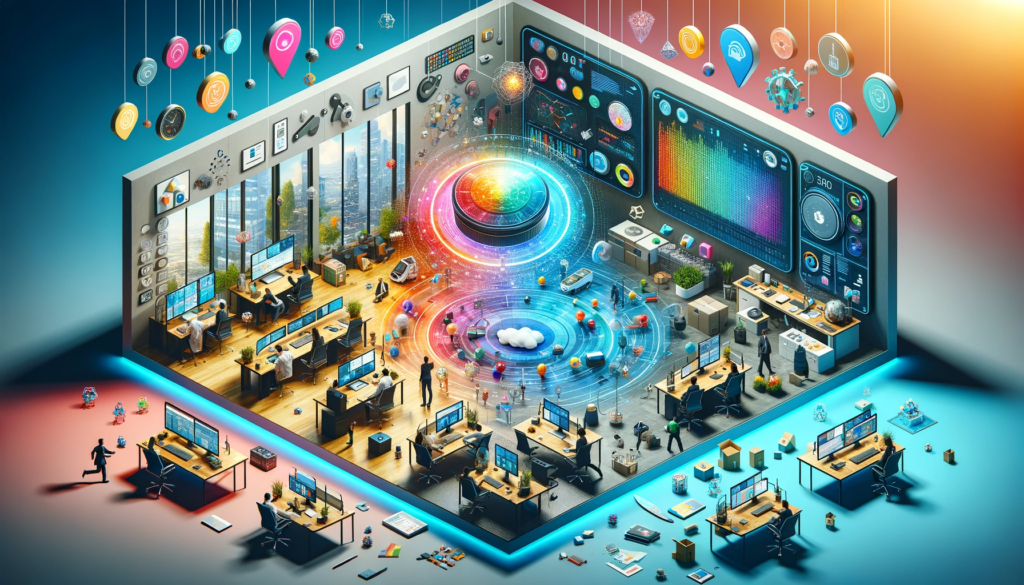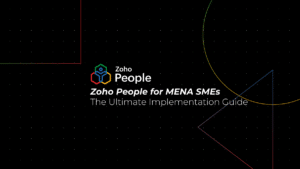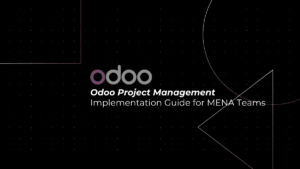In an age where data is king, the Internet of Things (IoT) stands as a revolutionary force, redefining how businesses interact with the world. The integration of IoT with Zoho’s suite of applications marks a significant leap in digital transformation, offering businesses unparalleled connectivity and smart decision-making capabilities. This blog delves into the myriad ways IoT integration with Zoho is reshaping business operations, enhancing efficiency, and driving growth in the digital era.
Table of Contents
ToggleIntroduction to Internet of Things and Its Impact on Business
IoT refers to the network of physical devices embedded with sensors, software, and other technologies to connect and exchange data with other devices and systems over the Internet. From manufacturing equipment to home appliances, Internet of Things is making the world smarter and more interconnected.
IoT’s impact on business is profound. It enables real-time monitoring, enhances operational efficiency, and provides valuable insights into customer behavior and market trends. Internet of Things data can drive innovation, streamline supply chains, and open new revenue streams.
Integration of IoT with Zoho Applications
The fusion of IoT with Zoho’s versatile applications is revolutionizing how businesses interact with data, automate processes, and engage with customers. Let’s delve deeper into how this integration catalyzes business transformation:
1. Broadening Data Connectivity with Zoho
- Integration Across Zoho Suite: IoT’s integration isn’t limited to a single application; it spans across various Zoho offerings. For instance, data from IoT devices can flow into Zoho CRM for customer insights, Zoho Analytics for deep data analysis, and Zoho Creator for custom app development.
- Streamlining Workflow Automation: Zoho Flow, in conjunction with Internet of Things devices, can automate complex business workflows. Sensors triggering events can initiate a chain of actions across Zoho apps, like updating records in Zoho CRM or triggering alerts in Zoho Desk.
2. Deepening Real-Time Data Insights with Zoho Analytics
- Predictive Analytics: By feeding IoT-generated data into Zoho Analytics, businesses can leverage predictive modeling to forecast future trends, customer behaviors, and market dynamics.
- Interactive Dashboards: Zoho Analytics allows the creation of dynamic, interactive dashboards that can display IoT data in real-time. This visual representation aids in making quick, data-driven decisions.
3. Elevating Customer Engagement with Zoho CRM
- Personalized Marketing Campaigns: With insights gained from Internet of Things data, Zoho CRM can help tailor marketing efforts to individual customer needs and preferences, thereby increasing the effectiveness of marketing campaigns.
- Enhanced Customer Service: IoT integration allows Zoho CRM to proactively address customer issues. For example, an IoT-enabled product could alert customer service in Zoho Desk directly when a technical issue arises, allowing for immediate and informed response.
4. Advanced Use Cases of IoT and Zoho Integration
- Supply Chain Optimization: IoT sensors in logistics can feed data into Zoho Inventory, providing real-time visibility into supply chains and enabling businesses to optimize inventory levels and reduce waste.
- Facility Management: Internet of Things devices monitoring facility conditions can integrate with Zoho applications to manage maintenance schedules, energy usage, and ensure optimal operational conditions.
- Custom Solutions with Zoho Creator: Businesses can use Zoho Creator to build custom applications that harness IoT data for unique use cases, such as remote monitoring of equipment or smart building management.
The Advantages of IoT Integration in Zoho
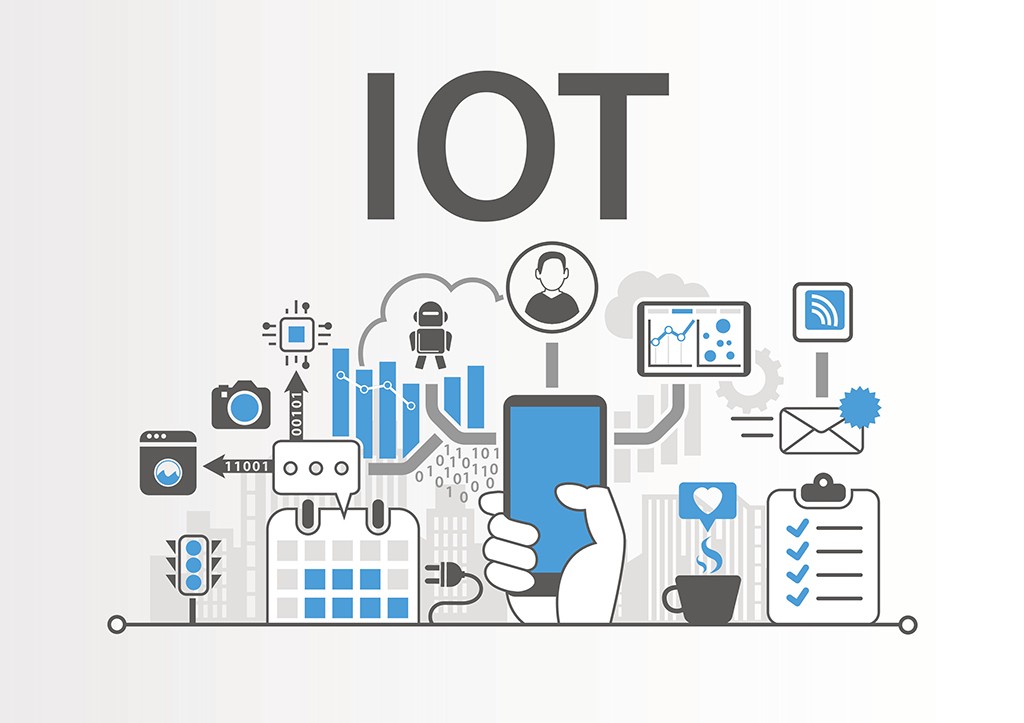
1. Improved Decision-Making:
Internet of Things integration with Zoho applications offers businesses a data-driven approach to decision-making. By analyzing IoT data, companies can make more informed choices that align with their strategic goals.
- The Power of Analytics in Decision-making: By feeding IoT-generated data into Zoho Analytics, businesses can delve into a deeper understanding of their operations, customer behaviors, and market trends. These analytics enable businesses to make decisions that are not just reactive but proactive and predictive.
- Actionable Insights from IoT Data: The real value of IoT data lies in its analysis. Zoho’s powerful reporting tools can dissect this data, providing actionable insights. This might include identifying patterns in customer usage, predicting equipment maintenance needs, or optimizing resource allocation.
- Strategic Business Advantages: Armed with these insights, businesses can tailor their strategies more effectively. They can enhance customer experiences, optimize operational efficiency, and ultimately drive growth and profitability.
2. Enhanced Automation and Connectivity
The synergy of IoT and Zoho extends beyond data analysis into the realms of automation and connectivity, streamlining business processes in unprecedented ways.
- Streamlining Operations with Automation: IoT devices can trigger automated workflows within Zoho applications. For example, sensors detecting inventory levels can automatically update Zoho Inventory or initiate purchase orders, streamlining the supply chain process.
- Improving Inter-departmental Connectivity: This integration fosters better communication and collaboration between departments. Data shared through Zoho’s interconnected platforms ensures that all departments have access to real-time information, leading to more coordinated and efficient operations.
- The Impact on Business Efficiency: By automating routine tasks and enhancing connectivity, businesses can focus their resources on innovation and strategic initiatives. This not only improves efficiency but also enhances employee satisfaction by reducing manual, repetitive tasks.
3. Predictive Maintenance:
In industries like manufacturing, IoT sensors can predict equipment failures before they occur. Integrating this data with Zoho applications allows businesses to schedule maintenance, reducing downtime and extending equipment life.
Security Considerations
Integrating IoT with business systems like Zoho raises important security considerations. The vast amount of data generated by Internet of Things devices, if not properly secured, can pose significant risks.
1. Ensuring Data Security and Privacy:
Zoho’s commitment to data security and privacy extends to its IoT integrations. This involves robust encryption, secure data storage, and compliance with international data protection regulations.
2. Addressing IoT-specific Security Challenges:
IoT devices, by their nature, can be vulnerable to attacks. It’s crucial that businesses implement strong security protocols for these devices and ensure that their integration with Zoho is secure.
3. Building a Secure IoT Framework:
Businesses should work with IT and cybersecurity experts to establish a secure IoT framework. This includes regular security audits, firmware updates for Internet of Things devices, and employee training on IoT security best practices.
IoT-Zoho Implementation Strategies
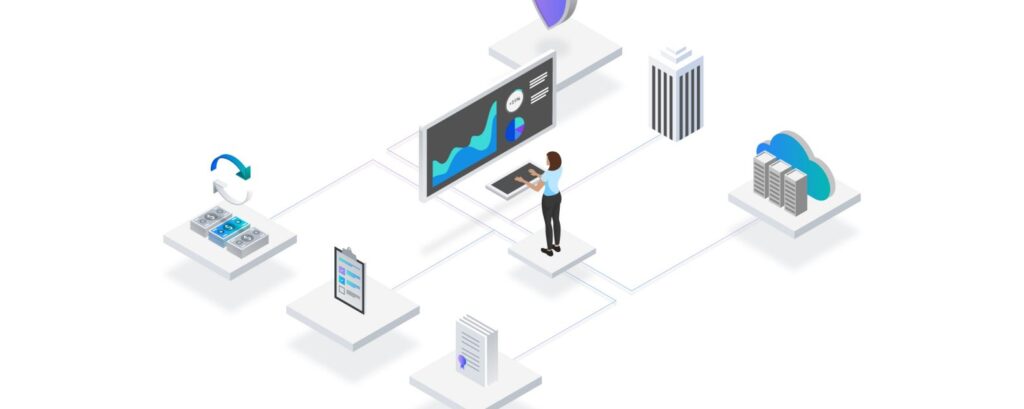
Implementing IoT integration with Zoho can be transformative for businesses, but it requires careful planning and execution.
1. Step-by-Step Guide for Implementation:
– Start with identifying the business objectives for IoT integration.
– Select appropriate Internet of Things devices.
– Ensure compatibility with Zoho apps.
– Plan for data flow and storage.
2. Best Practices for Smooth Integration:
Best practices include starting with a pilot project, ensuring strong communication channels between IT and other departments, and providing comprehensive training to staff members.
Overcoming Implementation Challenges in IoT-Zoho Integration
The journey to successfully integrate Internet of Things with Zoho applications can encounter several hurdles. Understanding these challenges and developing strategies to overcome them is crucial for a seamless and effective integration process.
Technical Integration Complexities:
Challenges: Integrating IoT with Zoho might present technical complexities, especially in ensuring compatibility between different systems and devices. Challenges can include data format discrepancies, connectivity issues, and ensuring real-time data synchronization.
Solutions: Employ middleware or Internet of Things integration platforms that can bridge gaps between IoT devices and Zoho applications. Regular testing and validation throughout the integration process help identify and rectify technical issues early.
Data Management and Analysis:
Challenges: The vast amount of data generated by IoT devices can be overwhelming. Effectively storing, managing, and analyzing this data to extract meaningful insights can be challenging.
Solutions: Utilize Zoho Analytics to its full potential, setting up data filters and employing machine learning algorithms for efficient data analysis. Implement robust data management strategies that include secure storage solutions and efficient data processing techniques.
Ensuring Seamless Connectivity:
Challenges: Ensuring continuous and reliable connectivity between IoT devices and Zoho applications is essential for real-time data flow and automation.
Solutions: Opt for reliable IoT platforms that offer stable and secure connectivity options. Regularly monitor the network performance and have contingency plans for connectivity issues.
Staff Training and Adaptation:
Challenges: The successful implementation of IoT-Zoho integration requires staff to be adept at handling new technologies and workflows.
Solutions: Conduct comprehensive training sessions for employees, focusing on how to use the integrated system effectively. Provide continuous learning opportunities and resources to help staff adapt to the new technology.
Partnering with Experts:
Challenges: SMEs may lack the in-house expertise required for a complex IoT-Zoho integration.
Solutions: Collaborate with IT consultants or specialized software developers experienced in IoT and Zoho integration. These experts can provide valuable insights, facilitate the integration process, and help tailor solutions to the specific needs of the business.
Scalability and Future Expansion:
Challenges: As the business grows, the integrated system must be able to scale accordingly.
Solutions: Plan for scalability from the onset. Choose IoT devices and platforms that can handle increased data and connectivity demands. Design the integration with Zoho applications in a way that allows for easy expansion and adaptation.
The Future of IoT and Zoho Integration
Looking ahead, the integration of IoT with Zoho is poised to unlock even more possibilities. As Internet of Things technology evolves, its integration with Zoho will become more sophisticated, offering businesses new ways to innovate and grow.
1. Advanced AI and Machine Learning: Future advancements in AI and machine learning will enhance the ability to analyze IoT data, providing even deeper insights and more accurate predictions.
2. Expanding IoT Ecosystems: As more devices become IoT-enabled, the scope of integration with Zoho will expand, offering businesses new ways to connect with customers and streamline operations.
3. Increasing Automation: The ongoing integration of Internet of Things with Zoho will drive higher levels of automation, further reducing manual tasks and improving efficiency.
As we’ve explored the dynamic world of Internet of Things integration with the Zoho suite, it’s evident that the potential for business transformation is immense. However, there’s another exciting aspect of this integration that deserves a spotlight — Zoho IoT. This dedicated application within Zoho’s ecosystem is specifically tailored to harness the power of IoT for businesses, and it brings a whole new dimension to the digital transformation journey.
Stay tuned for next week’s blog, where we will dive deep into Zoho IoT. We’ll uncover its features, benefits, and the transformative impact it can have on your business processes. From seamless data management to real-time analytics and scalable solutions, Zoho IoT is set to redefine how businesses interact with technology. Whether you’re just starting with IoT or looking to optimize your existing IoT strategies, this upcoming blog will be your comprehensive guide to understanding and leveraging Zoho IoT to its fullest potential.
So, mark your calendars and join us next week as we continue our journey through the cutting-edge world of IoT and Zoho. Get ready to unlock new levels of efficiency, innovation, and growth with Zoho IoT!
The integration of IoT with Zoho is transforming the way businesses operate in the digital age. It offers enhanced connectivity, smarter decision-making capabilities, and opportunities for innovation. By embracing this integration, businesses can gain a competitive edge, leveraging the power of IoT data to drive growth and success in the digital era.
